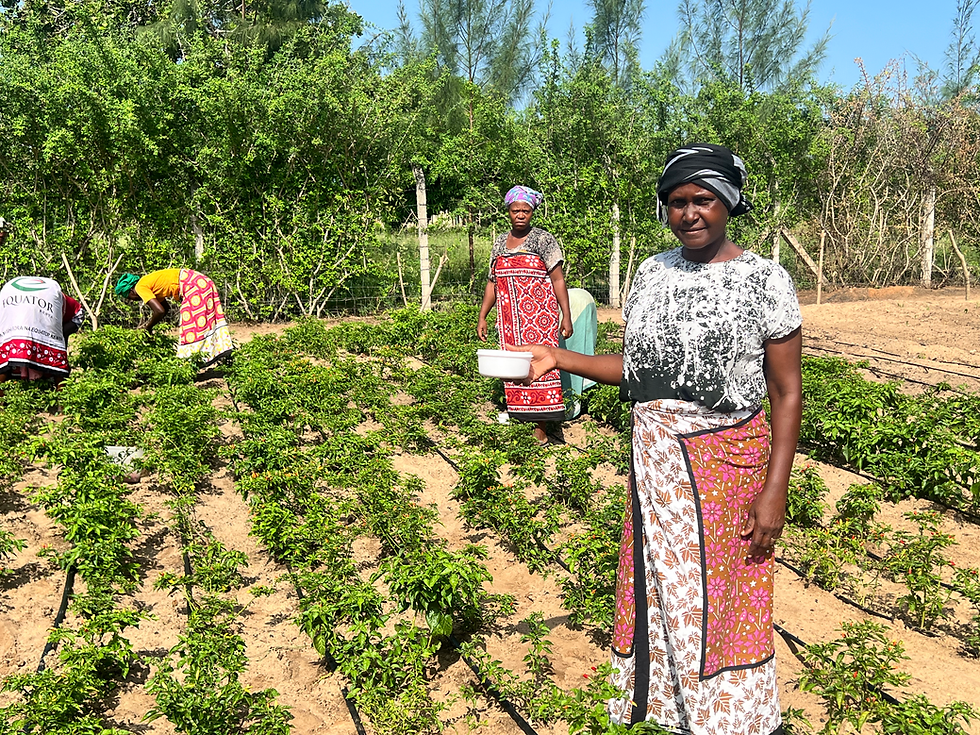Investing in Locally Led Development: How SUED is Working with Local Investors to Implement Sustaina
- Jul 27, 2023
- 3 min read

Introduction
Countries in Sub-Saharan Africa (SSA) are vulnerable to the adverse effects of climate change, yet they do not have adequate resources to protect themselves from anticipated damages such as altered rainfall patterns, disrupted ecological zones, change in atmospheric temperature, and sea level rise. All these impacts go beyond affecting the environmental sector to impacting the socio-economic structures in the SSA region. The challenge of adapting to climate change is greatest in these developing countries primarily because a) the topography that they have already predisposes them to higher temperatures that are not optimal for variety of economic activities such as farming, b) they face water scarcity which will be further exacerbated by the change in the frequency, intensity, and duration of extreme weather and c) they have heavy economic dependance on sectors that are primarily sensitive to climatic conditions. These challenges when compounded with the lack of adaptive capacity underpins the needs for a strong focus on climate-proof economic opportunities.
How the UK Government through SUED is addressing this
As a response to this, the UK Government funded Sustainable Urban Economic Development Programme (SUED) supported Kilifi County Government and Malindi Municipality, , to identify ways in which they could diversify their economic offerings beyond their primary economic stay - tourism.
The programme worked closely with the county and municipal leadership team to develop an Urban Economic Plan (UEP) that would strategically position its urban center to respond to future climatic conditions. To support the municipality to actualise the economic sectors identified in the UEP, SUED provided technical assistance to attract inward investments into climate resilient value chains and infrastructure projects that would sustainably respond to climate change. This is because, in the recent past, Kilifi County has experienced prolonged drought and erratic rainfall that has negatively impacted agriculturally dependent businesses.
One of the resilient value chains identified was the integrated chilli farming. The value chain involves sustainably managing a large, small holder farmer network to plant and harvest chilli which is then collected and processed for export by Equator Kenya Limited (EKL). With SUED support of £249,745, EKL is expanding its processing capacity to create a more climate resilient business to support chilli farmers in the region - The funding coupled with EKL’s own of £893,026 and third-party contribution of £105,036 will enable them to integrate more climate-smart technology at the processing facility. This will be through the installation of a solar photovoltaic (PV) system and energy efficient technologies to reduce the production downtime that they currently face due to blackouts from the local electricity grid. This will ultimately lower production costs and reduce grid dependency by up to 90% thereby reducing EKL’s carbon footprint.
SUED’s support is enabling EKL to work with 11,000 small holder farmers in the region who will benefit from market and income certainty while boosting their crop yields and resilience to climate change. Additionally, EKL is creating 1060 jobs in the first year and scale up to close to 5,000 new jobs in three years. SUED’s support is enabling EKL to double its annual dried chilli production from 70MT to 150 MT by 2025, diversify its chili processing activities and upgrade its current facility to become more climate resilient in its energy utilisation.
The funding is expected to generate the following climate benefits:
Transition to Solar Energy: The EKL factory is transitioning to utilising solar energy to meet 90% of its energy needs for the facility’s operations greatly reducing EKL’s carbon footprint.
Implementation of climate-smart technologies to support farm management and communication with farmers on agronomic alerts/advice to increase their climate resilience.
Reduction of post-harvest losses due to the expanded processing capacity and diversification into other chilli products like chilli oil and chilli flakes, EKL will reduce the amount of chilli rejected at the processing plant.
Introduction of carbon sequestration to improve the farmers’ soil carbon management.
Conclusion
The UK Government is providing stability for farmers by reducing middlemen who would exploit them as well as ensuring that post-harvest losses will be reduced due to improved handling and traceability of the produce. This will in turn improve farmer income and efficiency of production and incentivise farmers to invest more in climate resilient agro-produce.




Comments